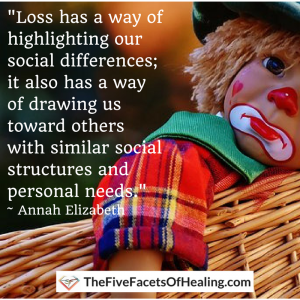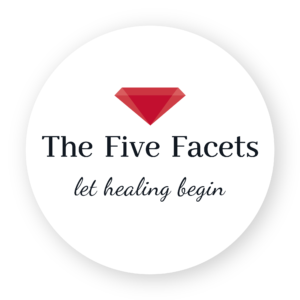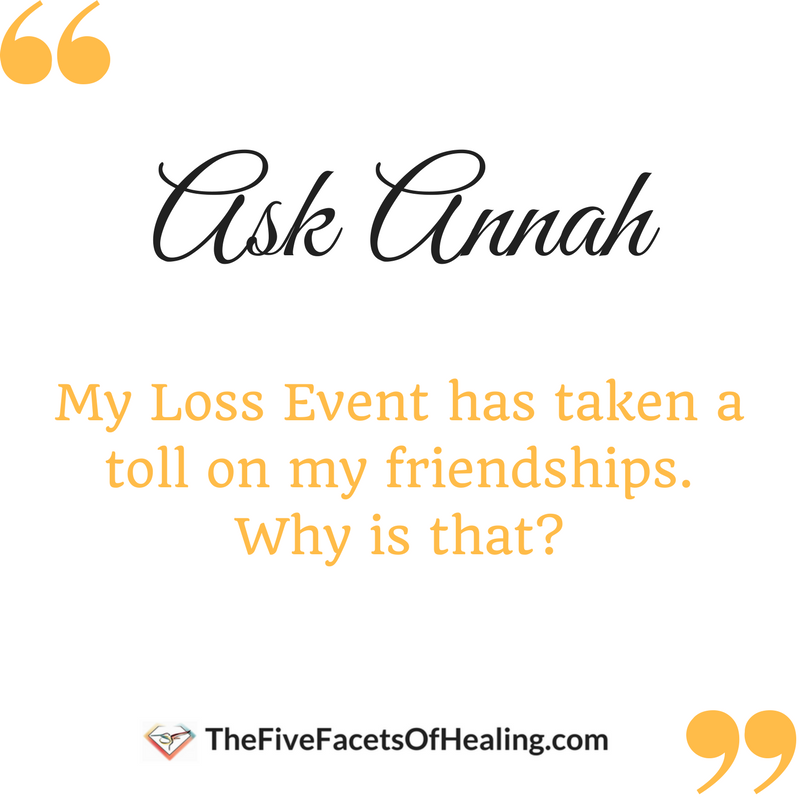“Friendships are discovered rather than made.” ~ Harriett Beecher Stowe
Dear Journeyer,
“Why do friendships change after a significant loss?” is a question and conversation I hear regularly from people of all ages and across all loss forms.
If you have discovered that your relationships with friends or family feel strange or estranged since a Significant Life Loss Event entered your lives, please know that you can navigate the adverse effects on your Social Facet.
Every situation is different, Journeyer, and each person stands before, behind, or beside you with their own beliefs, experiences, and fears. It is the blending of all these things that determine how people act and react when faced with loss and when dealing with grief.
You’re not being invited to those parties you once were or you’re doing the inviting and don’t know what to do.
Your best friend isn’t calling you every day like she used to.
You feel as if people are tiptoeing around you.
You feel some form of tension in the air so thick it feels like a weight on your chest.
You speak about your loss and people suddenly have to check that proverbial boiling pot of water or attend some event they “forgot about.”
Your friend wants to talk but all you can think about is your sudden inability to regulate your breathing.
You speak about your loss and someone changes the subject.
You’re with friends and you feel like you can’t be yourself.
Someone tells you that “You aren’t fun any more,” or “You’re not the same person you were before–.”
These and countless other conditions are situations the bereaved face with some regularity.
Why your friendships change after a significant loss event depends on multiple factors.
Let’s use The Five Facets Philosophy™ program to access these dynamics. First and foremost is the simple truth that can be so completely right for one person can be so completely wrong for another. Use these offerings as a guide to help you unearth the pieces that apply and feel right to you.
One of our biggest hurdles in life–in general–is communication; our own unique comprehension of words and phrases is a major factor in how we relate to and understand others.
“Let me know if I can do anything for you” is one expression we use often but one that may work to divide rather than unite us.
When someone we know experiences a loss, many of us want to help and most don’t have a clue where to begin. What happens when we put the distressed person in charge of getting back to us is that often times they won’t or can’t.
“Grief brain” or “fog brain” is common when we are under duress, which means the person may not remember who was present in those early hours and days and quite often they don’t know what they need, especially in the face of a major loss event.
As badly as I felt about it, I only remember a few of the dozen or so people who attended my newborn’s funeral and still to this day I can vividly recall only one “moment” that took place in the chapel. It’s not that I didn’t appreciate those who attended the service, and I certainly wouldn’t choose to forget the minister’s address. My entire being was in a state of numbness and taking care of business was all I could manage.
I often hear people lament, “I told her I’d help, but I haven’t heard back from her.” Sometimes the person who is offering assistance will feel slighted, not worthy, or downright rejected if she doesn’t “hear back.” If you fall into this category, please know that it likely has nothing to do with you. One advantageous approach is to offer specific help and ask if what you have to offer will be beneficial for the person you care about. If this help is not accepted, again, please know that the griever’s needs and desires are going to run rampant from minute to minute. Be gentle with yourself and with them.
“I know how you feel” is an expression that can be received as empathy or can cause conflict. Since no one else can occupy the space in our body or our mind, it is impossible for another to know how we feel. If this statement is received poorly, it can feel as if you are trying to take something away from the griever, and trust me, we can be pretty protective of the grief buffer. A safer, more universal expression is, “I can relate to feeling frustrated/angry/sad.”
The flip side to being able to relate on some level is an inability to associate to or accept how “close to home” a loss event is. Think about the times you couldn’t comprehend how someone might feel in a situation; chances are you were speechless or felt that any words you might say would be inadequate, at best. The griever often wants nothing more than to share, to vent, or a shoulder to lean on. Some people are unable to provide what you need in the way you need it.
Additionally, some grievers are begging for solitude, which means all those well-intentioned talkers with big, broad shoulders and open ears may have difficulty relating to one another. It’s not personal.
[Tweet theme=”basic-white”]Loss has a way of highlighting our social differences.[/Tweet]
 Loss events also draw us toward others with similar social structures and personal needs.
Loss events also draw us toward others with similar social structures and personal needs.
We have many questions in loss, from how to handle certain dynamics, to where to go for help and answers. Every type of loss has its similarly, yet unique challenges. What to do with the belongings of a newborn versus what to do with the estate of an adult child or how to how to partake in the raising of any surviving grandchildren have similar undertones yet detail drastically different needs.
As such, we may find ourselves becoming more involved with people who have experience in our situations, which lends itself to a sort of “growing apart.” That said, it’s important to note that it is possible to prolong grief by only focusing on the niche, and that we can often learn important strategies and skills from those who can look at a situation more creatively.
Comparison, labeling, and the nature of our loss events sometimes drive wedges in relationships.
Each of us has mentally developed a list of events we might be able to tolerate and those that we “could never survive.” These are not only different for each one of us, it’s important to recognize that we are often experiencing simultaneous losses that are layered. There are five umbrella loss categories from which all forms of loss are categorized. Quite often a significant loss will overlap into more than one of these headings.
Some of us have been conditioned to believe that the physical expiration of a person has a greater impact on us than say the death of hopes and dreams. Child loss has been labeled “The Worst Loss,” and experts themselves often divide the population by demanding that “child loss” pertains to older children.
Statistical data collection necessitates that we categorize child loss in such ways as Ectopic pregnancy, miscarriage, stillbirth, newborn death, and sudden infant death. Grief experts vary on how they classify “child loss” with some considering to include all of the above, while others propose that “child loss” should only encompass those above a specific age, typically outside of the toddler stage.
I believe child loss is child loss and its many forms include failed contract (as in adoption or surrogacy), pre-conception (as in infertility), and post conception (all of the other forms previously cited.) The death of our hopes, dreams and expectations can be as significant as a physical loss. Failure to recognize the validity of all forms of loss can separate us from one another for this type of thinking minimizes the value someone’s loss might have on them. Ultimately, we likely devalue some of our own loss experiences, too.
When we overlook certain loss forms, we are also inclined to want to “fix” or encourage “moving on” before a person has grieved his situation. This can lead to misunderstandings and resentments.
The first step in The 5 Steps of Healing is to choose grief, Journeyer, for without grief there’d be no need for healing.
Which leads us to the most important truth to remember when dealing with loss and relationships: each person grieves differently.
I have family members who have never spoken my son’s name in the decades since his death, and when his name comes up in conversation, they remain silent or change the subject. For years I took this as a personal affront: How could they forget my child? How can they ignore how important he is to me, my husband, and our living children?
I later learned to understand other perspectives. “What’s done is done,” “Can’t change the past,” and “Let bygones be bygones,” is more than a coping mechanism for many people, it is a form of resolution. This form of acceptance can be one of the strongest forms of faith.
Yes, it might be a form of denial or avoidance, but one thing to remember is that each of us walks our own paths through loss, grief, and healing, and when we can find a way to take the “personal” out of our story, we are more likely to keep our precious relationships intact, to welcome in valuable new neighbors, and to comfortably allow others to fade away.

